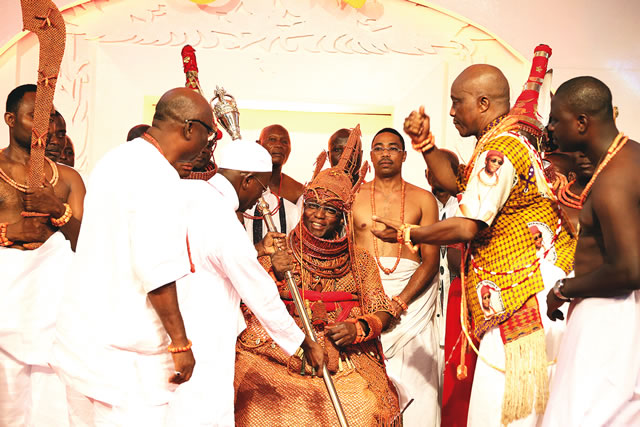
The Enuani people of Ubulu-Uku, especially the descendants of the legendary Ezemu, have a unique cultural and historical connection with the Benin Kingdom. Their role in the coronation of the Oba of Benin showcases the depth of their spiritual, medicinal, and diplomatic significance.
Ezemu: The Mystical Grandmaster
Ezemu was a central figure in Ubulu-Uku history, and according to Professor Iyke Nathan Uzorma in his book Occult Grandmaster Now In Christ, he was “one of the three greatest ascended occult grandmasters that ever lived on earth.” Mystical powers aside, Ezemu was a man of great influence not only among the Igbo settlements but also as far away as Benin, or Idu.
Before his mysterious ascension, referred to by his lineage as Okpulu, a symbolic transition through “a box,” Ezemu passed his mystical legacy to his grandson, Okpe. Though Okpe was technically Ezemu’s grandson, born to his only daughter, Ozim, Ubulu culture considered him a son. Ozim had been inducted as Idegbe, a female man, thus qualified to take on responsibilities meant for men.
Okpe: The Heir to Ezemu’s Powers
Okpe inherited Ezemu’s pot of charms and sorcery, hence he became important in the history of Ubulu-Uku. In such a way, a new charge of continuing the traditional role of Ubulu-Uku during the coronation of the Oba of Benin fell on him.
Okpe’s three sons, Oshueleze, Oshomi, and Nwaokolo, founded a culturally important quarter in Ubulu-Uku called Onicha-Okpe. This quarter, which was very famous in medicine, still plays a vital role in the health and security of the Obi of Ubulu-Uku. As stated by Emmanuel Ikemefunah and Obiajulu Anene in Sociology of Ubulu-Uku (2005):
“Till date, and to the end of time, this quarter produces those who see to the good health, protection, and safety of the Obi of Ubulu-Uku Kingdom. They prepare his herbs, attend to his medical needs, and are very close to the Obi. Onicha-Okpe is also strong in medical powers, as this has been handed over from father to child.”
This is summarized in the community’s expertise in medicine through the local saying: Onicha-Okpe wa gwo nsi, wa gwo aja, which means “Onicha-Okpe heals poison and cures ailments.”
Okpe’s Journey to Benin
Okpe gained popularity with the people and expanded into Benin as he was invited to restore the ailing Oba from an unidentified sickness. Having restored the monarch, the Oba refused to send him back to Ubulu-Uku. Okpe managed to escape, which explained the deterioration in relations between Ubulu-Uku and Benin.
He sent out another medicine man, related in Ubulu-Uku, into Benin when the trouble was resolved in Benin. This delegate came and settled in modern Agbado, in Benin. His families, just like the Okungbowa family of Idun-Isoko have to this very day, remain those keeping proper descendants linked through ties traced from the town of origin in Ubulu-Uku. The Chief at Agbado remains acquainted and is with the Ubulu-Uku royal palace all over for his ancestral patronyms; and, more importantly, with Ubulu-Uku the home city.
Ubulu-Uku’s Role in Benin Coronations
The enthronement of a king in both Ubulu-Uku and Benin is not complete without the performance of some rites by Onicha-Okpe. These are believed to strengthen the monarchy and ensure the spiritual and physical protection of the king. The current monarchs of Ubulu-Uku and Benin have both gone through these age-old rites, keeping the tradition alive for centuries.
In Esther Wright’s The Story of Ubulu Kingdom, are recorded the visits of two Benin Obas to Ubulu-Uku. One such was the visit of Oba Ovonramwen during his exile to Calabar. He passed the night in Ubulu-Uku and was hosted by Obi Nwajei. That visit left a cultural signature with such aphorisms as Oba-anwuna, Obi-anwune and Obanor sticking in folk memory.
Legacy of Onicha-Okpe
Onicha-Okpe’s influence cuts across rituals and medicine. It is a symbol of resilience, diplomacy, and cultural heritage. The strong kinship ties between Ubulu-Uku and Benin bring out the interconnectivity of African societies in terms of their shared history.
The legacy of Ezemu and his descendants—through their mystical, medicinal, and diplomatic roles—emphasizes the relevance of Ubulu-Uku’s continued contribution to the Benin Kingdom. This is still a people steeped in tradition, guardians of ancient knowledge that they proudly maintain up to this day.
References
- Ikemefunah, E., & Anene, O. (2005). Sociology of Ubulu-Uku.
- Mordi, E. N. (2009). The Benin monarchy: Continuity and change in ritual and political practices. Studies of Tribes and Tribals, 7(1), 47–55. Retrieved from krepublishers.com
- Ngozi Fortune, O. (n.d.). Onicha-Okpe and the legacy of Ezemu.
- Opone, P. O. (2012). The evolution of socio-political structures in Benin Kingdom and the role of kinship. Studies of Tribes and Tribals, 10(1), 57–67. Retrieved from krepublishers.com
- Uzorma, I. N. (n.d.). Occult Grandmaster Now In Christ.
- Wright, E. (2017). The Story of Ubulu Kingdom.
- Ibusa.net. (n.d.). The cultural heritage of the Enuani people of Ibusa.
- SOAS Research Online. (n.d.). Power and influence in the history of the Benin monarchy: A socio-cultural analysis.


